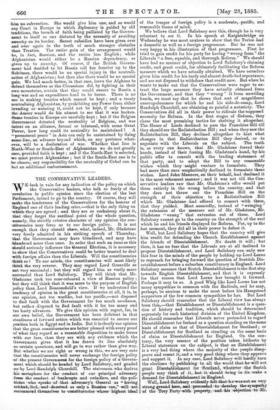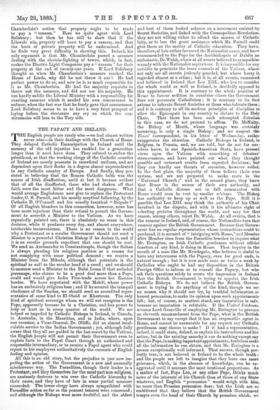THE CONSERVATIVE LEADERS.
WE look in vain for any indication of the policy on which the Conservative leaders, who talk so freely of the -revolution -in public opinion since the election of the last Parliament, intend to go to the country. Of course, they will mute the -tenderness of the Conservatives for the honour of England one of their-leading cries,—that is the only thing on -which they are agreed ; and they are so coekahoop about it, that they forget the cardinal point :of the whole question, -namely, the :strictly relative character of . any opinion the constituencies may form as to our foreign policy. It is not 'enough that they-should shew, what, indeed, Mr. Gladstone very freely admitted in his striking speech 'of Thursday, that -the Government :may have blundered, and may have -blundered more than 'once. In order that such an issue as this should 'seriously influence the general 'Election, it is necessary to show that the Conservatives could -be better trusted to deal with foreign affairs than the Liberals. Will the constituencies think so ? To our minds, .the constituencies -will most likely think the very reverse. .They may regard Lord Granville as not very successful ; bat they will regard him as vastly more successful than Lord Salisbury. They will think that Mr. Gladstone took too rose-coloured a view of Russian policy ; but they will think that it was more to the purpose of English policy than .Lord Beaconsfield's view. If we understand the tendency of opinion in the great constituencies at all, it is, in our opinion, not too warlike, but too pacific,—not disposed to find fault with the Government for too much meekness, but rather disposed to find fault with it for too many and too hasty advances. We give this opinion with regret, for, in our own belief, the Government has been deficient in that steadiness of forward action which was -essential to secure our position both in Egypt and in India. But it is clearly our opinion that the great constituencies are better pleased with every proof of 'what they regard as a reasonable disposition to make terms with our foes, than they are with any evidence which the Government gives that it has drawn its line absolutely on certain questions, and will go to war rather than give way. But whether we are right or wrong in this, we are very sure that the constituencies will never exchange the foreign policy -of -the present Government for the foreign. policy of a-Government which should beheaded by -Lord Salisburyrand goaded anby Lord-Randolph: Churchill. -The statesman who derives ihis metaphors for the -conduct of our principal adversary from the conduct of bankrupts and swindlers, and the politician who speaks of that adversary's General as " having tricked,bed, and -deceived as only a Russian can," :will not recommend themselves to constituencies :whose highest ideal of the temper of foreign policy is a moderate, -pacific, and reasonable frame of mind.
We believe that Lord Salisbury sees this, though-he is very reluctant to see it. In his speech at Knightsbridge on Wednesday he was most anxious to show that the Tories had a domestic as well as a foreign programme. But he was not very happy in his illustration of that programme. First he tried to gain credit for his party for having "wrung. from "the Liberals " a free, equable, and thorough Reform." We should have had no manner of objection to Lord Salisbury's claiming credit, and great credit, for ultimately facilitating the Reform measure which we have actually obtained. We have ourselves given him credit for his tardy and almost death-bed repentance, and are not disposed to withdraw that credit now. But when he wants to make out that the Conservatives were eager to extract the large measure they have actually obtained from the Government, and that they " wrung " it from unwilling hands, we must say that he shows that sort of magnificent unscrupulousness for which he and his aide-de-camp, Lord Randolph Churchill, are obtaining so painful a notoriety. The Conservatives did all in their power to ridicule the supposed necessity for Reform. In the first stages of ,Reform, they chose the most promising tactics for shelving it altogether. The House of Lords declined to pass the Franchise Bill:till they should see the Redistribution Bill ; and :when they saw :the Redistribution Bill, they declined altogether to hint what changes in that Redistribution Bill they. desired, or -to negotiate with the Liberals on the subject. The truth is, as every one ..knows, that Mr. Gladstone -forced -their hands, instead of their forcing Mr. Gladstone's hand, by-his public offer to consult -with the leading statesmen of that party, -and to adapt the Bill to any reasonable wishes which they might venture to formulate. They had more than once emphatically declined to formulate those wishes. Lord John-Manners, on their behalf, had :declined-it in the -most vehement manner ; and it was not till the Conservative leaders saw that Mr. Gladstone's offer -would put them entirely in the wrong before the country, and that they •dare not throw out the Franchise Bill on the strength of their objection to a Redistribution .Bill which Mr. Gladstone had offered to concert -with them, that they yielded. Most assuredly, instead of " wringing " the extension of the measure out of Mr. -Gladstone, Mr. Gladstone " wrung " that extension out of them. -Lord Salisbury cannot• go to the country on the strength of the zeal which he and his friends displayed for Reform. •For, up to the last moment, they did all in -their power to defeat it.
Well, but Lord Salisbury.hopes that the country will give him 'credit for defending the Church Establishment against the friends of Disestablishment. No doubt it will ; but then, it has no fear that the Liberals are at all inclined to propose Disestablishment, and Lord Salisbury can-only-sow this fear in the minds of the people by holding up Lord Lorne to reproach for bringing forward the question of Scottish Disestablishment before a suburban constituency in England. Lord Salisbury assumes that Scotch Disestablishment is-the first step towards English Disestablishment, and that it is expressly for that reason that Lord Lorne has brought it forward. Perhaps it may be so. A good Whig like Lord Lorne has not many sympathies in common with the Radicals, and he may, perhaps, be anxious to make the most before his Hampstead supporters of the few common sympathies he has. But Lord Salisbury should remember that the Liberal view has always been this,—that Establishment or Disestablishment is a•question of history and tradition, which should be determined separately for each historical division of the United Kingdom. He should remember that Liberals never pretended to regard Disestablishment for Ireland as a question standing on the:same basis of claim as that of Disestablishment for Scotland ; or Disestablishment for Scotland •as standing on the same basis of claim as Disestablishment for England. On the contrary, the very essence of the position taken hitherto by Liberal statesmen on the subject, is that an Establishment is a very bad thing where the majority of the people disapprove and resent it, and a very good thing where they-approve and support it. In any case, Lord-Salisbury-will-hardly turn the elections :by publishing to all the world tlaathe will not grant .Disestablishment for -Scotland, whatever The Scotch people may think of it, lest it :should bring in its :wake a demand for Disestablishment in England.
Well, Lord-Salisbury evidently felt that he-was not on very strong ground here, and proceeded to develop the :sympathy of the Tory Party with property, and his objection to Mr. Chamberlain's notion that property ought to be made to pay a " ransom." Here we quite agree with Lord Salisbury ; but then he has still to show that if the Liberals win, property will have to pay a ransom, and that the basis of private property will be undermined. And he finds very great difficulty in showing this. Indeed, his only argument is that Mr. Chamberlain passed a measure dealing with the electric-lighting of towns, which, in fact, makes the Electric Light Companies pay a " ransom " for their property at the end of twenty-one years. If Lord Salisbury thought so when Mr. Chamberlain's measure reached the House of Lords, why did he not throw it out ? He had perfect power to do so, and now he is as much responsible for .it as Mr. Chamberlain. He had the majority requisite to throw out the measure, and did not use his majority. He can hardly saddle the Liberal Ministry with a responsibility for exacting ransoms which it needed his own concurrence to enforce, when the fact was that he freely gave that concurrence. Lord Salisbury seems to us to have a very faint prospect of laying before the electorate any cry on which the constituencies will lean to the Tory side.



































 Previous page
Previous page